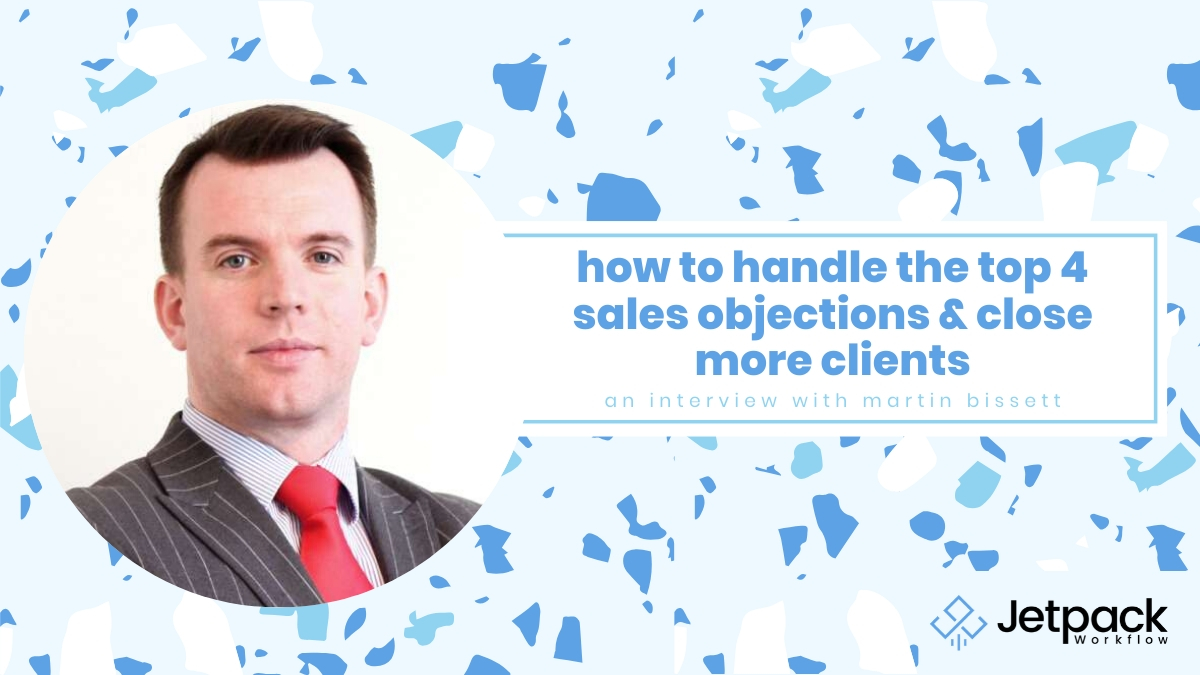How to Handle the Top 4 Sales Objections & Close More Clients

“If you had been in the art of closing deals and after 10 years heard a new sales objection, you didn’t listen properly”
These were the wise words Martin Bissett heard as he worked to close more clients for his firm. Since then, Martin realized there is a massive need for CPA firms to learn more about not just doing great client work, but delivering client value every single year.
After over 15 years in the profession, Martin now runs a successful consulting business in the UK and is seen in many of the largest publications in the CPA profession including Accounting Today and Accounting Web.
In this interview with workflow software founder, David Cristello, Martin Bissett gives you tactics and mindset bits to start growing your firm faster including:
- How to handle the top 4 objections to get the prospect to become a client
- The subtle thing you do a prospect can *sniff* out to cause you to lose the deal
- The 3 Wars disrupting the CPA profession (it’s already been disrupted overseas and it’s coming to the US)
- Martin Bissett’s site (sign up for his growth tips)
- Interview with Jay Holmes – Shifting your CPA firm
- Value Pricing Discussions
- Free content Martin releases on his site
The Most Common Objections & How to Overcome Them:
Martin Bissett started off in IT before turning to the accounting profession. He’s seen major shifts in how firms are run. There’s been much disruption in other financial sectors but not yet accounting.
Martin’s tip: Typically, for shifts in the accounting industry, it starts in Australia, makes its way to Europe then on to the United States. He’s going to touch on more in these shifts below.
For now, what he recognizes as a stumbling block for CPAs (notoriously known for not enjoying business development much less social interaction…) is overcoming objections when a new prospect is interested in getting help. Prospects, at times, aren’t always upfront with what they need and tend to put off decisions.
Martin digs deep, probing the prospect with questions to get to the core of the matter. Getting on the same page is critical to closing the sale. Martin sees these 4 objections (below) about 75% of the time and he can show you how to easily deflect them and close.
Sales Objection #1: “I will think about it…”
Usually, a prospect says this when they don’t have the “guts” to say “No.” They defer on making a decision and Martin finds most won’t ever get back to you (phone calls never returned, emails not answered).
Turnaround: Put a Date on the Calendar
The *worst* thing you can do is to leave a prospecting call without another clear step. To get around this objection you simply ask for a specific NEXT time. If they say “they need to think about it and talk to their partner”, you respond “Great, when will you have time to speak with them?” You get an answer and say “Ok, I’ll come back and talk then, let’s set up a time.”
If they aren’t willing to set a time, they most likely aren’t interested.
Sales Objection #2: “[They give reason unrelated to situation] “We are going on vacation next week…”
Here, a prospect is taking an unrelated event and making it an excuse not to push forward. Prospect goes on vacation for a week, then they have to catch up on work, and before you know it, a month goes by without progress.
Turnaround: Convince them it only makes sense to start TODAY.
Explain to them how all the issues they are facing will still be there and getting it tackled earlier on is much better than putting it off. It’s your job to be direct and say “Your vacation doesn’t affect the problem you have now, let’s get this done right away.” You must dig down into this and help them understand (and not procrastinate).
Sales Objection #3: “[Half Truth] Why pay more for the same service as that other firm?”
Here you might think you are engaging in a price war, but it’s actually a simple misunderstanding of what you offer. Martin sees a major opportunity for offering more value than your competitors and getting to charge more (see below).
“The Price Of A Competitor Can Be Cheaper, But Don’t Let the Value Be Equal” – Martin Bissett
Turnaround: Offer more value
There’s no “magic” script here. It’s simply laying out all the value you can provide them. You should be providing them value already for free while you are engaged in negotiating. You don’t want to engage in price wars. Simply, make sure the client is seeing apples to apples. A competitor may do bookkeeping for cheaper, but you have advisory and analysis included in your bookkeeping because you want to help the client learn from mistakes and grow. That’s valuable.
Show them you provide extra value.
Sales Objection #4: “[Actual Objection] Health crisis…business crisis…bankruptcy…”
Here the client has an (actual) outside circumstance that is blowing up the deal.
Turnaround: […]
There is none. Some things you just can’t fix nor do you want to close a prospect that shouldn’t be sold to. Here, there’s no workaround. Martin recommends “withdrawing from the discussion” and offering to help them in a different way as they go through a crisis. Ethical sales.
Key Points:
- Clients sometimes need your help to guide them to the sale
- Ask questions — probe — dig deep
- Objections are NOT personal attacks. Sometimes it’s just not the right time.
“If they aren’t prepared to work with me, why continue the conversation”
You want to work with people ready and needing of your help. Don’t waste time with those who are wasting yours.
The Winning Mindset to Close Deals:
Martin explains when you have your pipeline full, you are less desperate for deals and thus less desperate to lower your prices. (Meaning you can charge much more).
The Secret to Success?
Convince yourself you are worth the money. Prospects can *sniff* out when you don’t fully “believe” in what you are selling and they won’t buy (out of fear). To build that confidence, simply ask “How can this prospect benefit with me better than their current CPA firm?”
It then just boils down to what value you can provide. Comb through the outcomes you’ve generated for past clients. Relay these successes to prospects.
You must stop seeing yourself as a “sales-y” salesmen but as someone who “makes a contribution to the life of a client.” You make their business better.
Now, you have a different mindset. One that leads to more clients.
The 3 Wars Waging in the CPA Profession:
Martin sees 3 major wars going on in the profession:
- The WAR for loyalty : Retaining clients and doing more for them (clients expect more). Instead of just doing the same thing each year, you’re having to fight off new competitors willing to go the extra mile.
- The WAR on talent: Retaining your own employees (accounting recruiters are growing)
- The WAR on the commodification of compliance work.
This 3rd piece is critical. Nowadays with new technology, cheaper compliance work is much easier to get your hands on. Simply, “doing” compliance work for your client isn’t enough to keep them interested anymore.
Martin suggests a radical shift:
OFFER COMPLIANCE FOR FREE. Include in the back-end advisory and other services which you charge for in exchange for doing compliance free. Giving it away is a great way to get a foot in the door. This shift has already taken place in Australia and the UK and moving west.
[DAVID’S TIP: Instead of putting $5,000 into advertising, put it into free compliance work. You’ll see a much better return]
Martin has his finger on the pulse of the industry. He sees what’s changing and knows firms must change with it. Start with free compliance work, test it out with a new prospect. Use it as a foot in the door to sell back-end services such as advisory services or other similar services.
Since compliance is a commodity now, how are you different?






